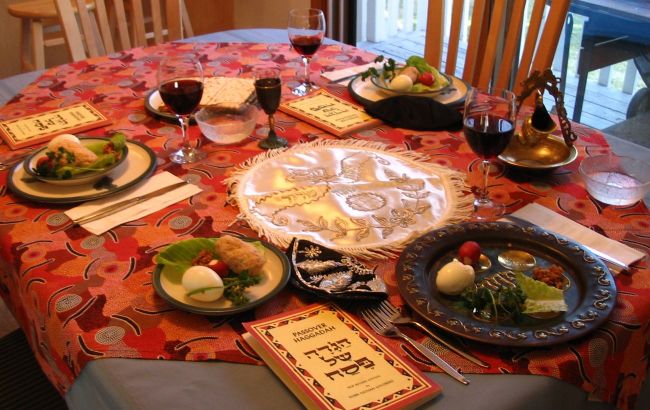Passover 2024: Main traditions and prohibitions of Jewish Passover
 Passover marks the liberation of the Jewish people from years of slavery (wikimedia.org)
Passover marks the liberation of the Jewish people from years of slavery (wikimedia.org)
In 2024, the celebratory days of the central Jewish holiday of Passover, or Jewish Easter, fall between the evening of April 22 (Monday) and the night of April 30 (Tuesday).
Here's what is known about this holiday, its traditions, and prohibitions.
Sources used in preparing the material: Tvoye Misto, Chas News, Wikipedia.
About Passover
Passover or Pesach is the central Jewish holiday commemorating the mass exodus of Jews (Israelites) from Egypt (led by Moses).
It begins on the 14th day of the month of Nissan (according to the Jewish calendar) and is celebrated for 7 days in Israel and 8 days outside its borders.
It is also observed by the Karaites, Samaritans, and partially by Messianic Jews.
The literal translation of the name of the holiday Pesach is "passed over," meaning that the Lord showed mercy and passed over the Jewish houses, while striking the Egyptian families with his wrath.
The holiday is based on the biblical story of the tenth plague of Egypt, according to which another plague struck the Egyptians for enslaving the Jews and Pharaoh's refusal to release them from slavery. Jewish families whose houses were marked with sacrificial lamb's blood were able to avoid God's wrath.
Only after all the firstborns in Egyptian families began to die did the Jews, by the will of the Almighty and led by Moses, receive the long-awaited liberation from slavery and make the Exodus from Egypt (wandering through the desert for 40 years).
Therefore, Passover symbolizes the liberation of the Jewish people from years of oppression and slavery, liberation from tyranny, and the desire for freedom.
Main traditions of Jewish Easter
Historically, special traditions have been established for celebrating this great holiday for each Jewish family. Primarily, these days are spent in prayer and Torah reading by the Jews.
In the evening of the first and second day of Passover, the entire family gathers around the table.
This ritual dinner is called the "seder," and all the needy are invited to it, as well as those who cannot celebrate the holiday with their families for any reason.
The table should not be crowded with dishes, so the approximate menu may include:
- Matzah (unleavened bread made from wheat flour)
- Beitzah (boiled or baked eggs)
- Meat on the bone
- Dishes with bitter herbs and bitter greens
- Water with a diluted spoonful of salt (for dipping the greens)
- Fruits and dishes made from them
Stuffed fish may also be served after these dishes.
Wine and juice are allowed as beverages. However, one glass must be left aside for the prophet.
From the third to the sixth day, believers may go to work but are not accustomed to working.
And the seventh and eighth days are festive again. Passover ends with prayer and the consumption of matzah and wine.
What is strictly prohibited during the Passover holiday
During Passover, it is forbidden to consume or keep at home foods:
- Made as a result of fermentation
- Prepared with leaven or yeast
Regular utensils cannot be used, as there is a belief that throughout the year they "absorb" prohibited products.
Furthermore, any work is prohibited on the first and last days of Passover.

